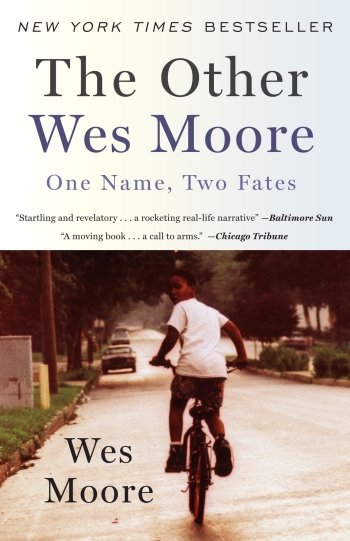
3 Sentence Summary
“The Other Wes Moore” is a captivating narrative nonfiction book by Wes Moore. The book explores the stories of two black men, both named Wes Moore, who grew up in similar circumstances in Baltimore and the Bronx, raised by single mothers. While one became a Rhodes Scholar and successful author, the other was sentenced to life in prison for murder.
Summary Read Time: Less than 5 minutes
Actual Book Length: 233
First Published in: 2010
Below is the detailed yet quick summary of the book:
Part 1- A Tale of Two Lives and How They Diverged
“The Other Wes Moore” is a captivating book that explores the lives of two men named Wes Moore, born in similar circumstances in Baltimore, but whose lives took vastly different paths.
Moore shares how he met the other Wes Moore, who is serving a life sentence for murder. He also shares how they decided to collaborate on a book about their lives. Their purpose is to provide insight into how circumstances and personal choices can shape destiny and inspire young people to make positive choices.
Moore takes readers on a journey through their childhoods, beginning with how Wes playfully punched his sister at the age of three, causing his mother to become furious. We learn that Joy, Wes’s mother, immigrated to the United States from Jamaica. She then met Bill, who became her husband and father to Nikki, but was abusive and had a drug addiction.
After leaving Bill, Joy met Moore’s father, Westley, a radio journalist who passed away from acute epiglottis, leaving behind his family.
The narrative then shifts to Wes’s family, where we meet his mother Mary, who drops out of college due to the termination of her Pell grant. Wes feels protective of his mother because his father, Bernard, is not present in his life.
Mary’s parents are also deceased, with her mother dying from a failed kidney transplant, and her father being an alcoholic. We see Wes meet his father for the first time when he is eight years old, sitting on his grandmother’s couch in an alcoholic stupor.
Moore examines how the absence of fathers impacted both Wes and himself, with Wes being bitter and Moore deeply emotional.
Part 2 – The Coin Flip of Fate
Two years later, Wes and his mother move to Northwood, a safer neighborhood in Northeast Baltimore. Wes is a talented football player but struggles academically. During a scuffle with a neighbor, Wes grabs a knife, and the police are called. Wes’s friend Woody is also arrested.
Meanwhile, Moore’s family has moved in with his grandparents in a Bronx neighborhood that is affected by the crack epidemic and gang violence.
Concerned about Moore’s education in the Bronx, his mother sends him to Riverdale. Riverdale is considered a prestigious private school, where he is one of the only black students. As he faces teasing for attending a “white school,” Moore feels increasingly conflicted and struggles with his grades.
In Baltimore, Wes’s older half-brother Tony is shot during a drug deal, and Wes becomes envious of his expensive wardrobe. Skipping school, Wes discovers his mother’s weed stash and gets high for the first time. He decides to join the drug game.
As Wes’s story unfolds, Moore reflects on his own life and the decisions that led him down a different path. The contrast between the two men’s experiences highlights the role that circumstance and opportunity play in shaping one’s destiny.
In the second interlude, Moore and Wes engage in a discussion about maturity. Moore expresses his belief that he became a man when he first became responsible for others. While Wes notes that taking care of others can be challenging.
Wes argues that second chances are only meaningful when accompanied by a change in circumstances, a view shared by Moore.
Part 3 – the Turning Point
Chapter Four of the book depicts the lives of two young men, Wes and Moore. Wes has been involved in the drug game for three years and lies to his family that he is making money as a DJ. However, his brother Tony discovers his stash of drugs, and Mary flushes them down the toilet.
Wes yells at Mary and accuses her of wasting $4,000. Meanwhile, Moore performs poorly in school and is handcuffed by the police for spray-painting graffiti. He is tearful, but the following week, he is back on the streets spraying graffiti again.
Joy, Moore’s mother, enrolls him in military school after he playfully hits Shani and splits her lip. He tries to run away four times, but Joy insists that he must stay. Colonel Battagliogli allows Moore to speak on the phone for five minutes during the final attempt, where Moore begs to come home, but Joy refuses.
After the call, Moore is mentored by Captain Ty Hill, a distinguished cadet, and becomes disciplined, polite, and hard-working. In contrast, Wes has a dozen girlfriends, including Alicia, who becomes pregnant two months after meeting him.
At Mary’s baby’s first birthday party, it is revealed that Wes has impregnated Alicia, but he still fails to stop seeing other girls.
Military school has a transformative impact on Moore, and he excels in basketball, receiving recruitment letters from numerous colleges. Despite his talent, his Uncle Howard reminds him to have a backup plan.
One evening, Moore and another cadet, Dalio, are harassed by a group of drunk teenagers at a local pizza place. One of them throws a heavy object at Moore’s face. Instead of retaliating, Moore chooses not to respond and ensures that he and Dalio make it home safely.
Part 4 – The Final Verdict
In the final interlude of “The Other Wes Moore,” Wes acknowledges that he believes people’s environments shape their destiny.
Meanwhile, Moore is training as a paratrooper and finds inspiration in Colin Powell’s autobiography, leading him to earn an associate’s degree and become one of the youngest officers in the American military. Wes has two children with two different women, one of whom is addicted to heroin.
Tired of the drug game, Wes enrolls in the Jobs Corps program and earns his GED and vocational training as a carpenter. But he ultimately goes back to dealing drugs after struggling to make ends meet.
The narrative jumps forward, and Mary learns that Tony and Wes are wanted for murder. This results in Wes being found guilty and sentenced to life in prison while Tony accepts a plea deal.
In the epilogue, Moore provides updates on the characters of Wes & Moore. With Wes being a grandfather in prison while Moore has had an exceptional career after earning a master’s from Oxford. Moore reiterates that the support of his family and community was key to his success. He notes that it is difficult to identify one factor that differentiated his and Wes’s destinies.
In the afterword, Moore notes that readers have their own interpretations of what caused the difference between his and Wes’s paths. He was pleased to hear that his book inspired a teenager in juvenile detention to make positive changes in his life.
The “call to action” by Tavis Smiley encourages readers to recognize their own power and try their hardest, leaving the rest to God. Overall, the book encourages readers to reflect on the impact of their environment and the importance of support in shaping their destiny.





